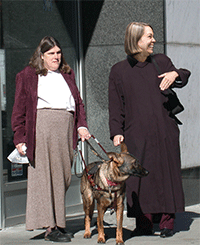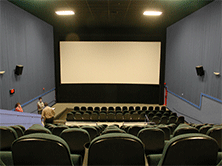
GROUP HOME FOR ADULTS WITH DISABILITIES MAY NOT BAR AN APPLICANT WHO HAS AIDS
The Department has settled a case against the owner and manager of Boyers’ Personal Care Homes in Beaver Falls, Pennsylvania. The Department asserted violations of the Fair Housing Act, specifically Boyers’ refusal to house an applicant with AIDS. The consent order prohibits future discrimination by requiring the defendants to (1) adopt and notify others of their new nondiscrimination policy, and (2) maintain and report records for compliance monitoring purposes. Additionally, the defendants must pay $7,000 to the estate of the applicant and $2,000 to an AIDS service organization that assisted him in his search for alternate housing.
The case was referred to the Justice Department by the Department of Housing and Urban Development.

CALIFORNIA RETIREMENT COMMUNITY IS SUED FOR DISCRIMINATING AGAINST PEOPLE WITH DISABILITIES
On December 20, 2004, the Justice Department filed a lawsuit in federal court in the Eastern District of California against Covenant Retirement Communities West, Inc. (“CRCW”), doing business as Covenant Village of Turlock, Mount Miguel Covenant Village, and The Samarkand.The suit alleges that the continuing care facilities engaged in a pattern or practice of discrimination against tenants and prospective tenants with disabilities and denied rights to a group of people in violation of the Fair Housing Act.
Specifically, it is alleged that CRCW required people with disabilities who use motorized mobility aids at the three facilities to obtain personal liability insurance; barred the use of mobility aids in interior common areas, including dining rooms; and, at the Samarkand, set restrictive training requirements on people who used motorized mobility aids. In addition, CRCW purportedly steered people with mobility impairments from independent living to assisted living at Covenant Village of Turlock.
This case was referred to the Justice Department by the Department of Housing and Urban Development.

LOCAL COMMUNITY WILL NOT BLOCK HOME FOR PEOPLE WITH DISABILITIES
The Department and the City of Hanford, California, settled a case alleging that Hanford had violated the Fair Housing Act by attempting to close a home for people with disabilities. Efforts to close the home resulted from complaints by neighbors of people with disabilities living in their community. The agreement provides for the continued operation of the home and prohibits the city from engaging in future housing discrimination based on disability. It also requires the city to pay $55,000 in compensatory damages to current and former residents of the home.
As part of the agreement, Hanford adopted an ordinance that provides a process for people with disabilities to apply for exceptions to the city’s zoning and land use requirements when such exceptions may be necessary to afford equal access to housing. The agreement also makes clear that people with disabilities and group homes for people with disabilities need not seek permission from the city to continue their operations when acting in accordance with applicable zoning, licensing, and land use laws.
The case was referred to the Justice Department by the Department of Housing and Urban Development.

RETIREMENT COMMUNITY IN TEXAS
SETTLES DISABILITY DISCRIMINATION CASE
In a benchmark case for fair housing compliance, the former owner, current owner, and manager of The Summit at Newforest (now Newforest Estates Retirement Community) in San Antonio, Texas, agreed to settle a lawsuit brought by the Department under the Fair Housing Act. Newforest Estates is an independent living retirement community with individual apartment units and common areas, including common dining facilities. Retirement communities like this are subject to the Fair Housing Act, which specifically prohibits placing terms and conditions of tenancy on residents with disabilities that are not placed on other residents.
In its suit, the Department alleged that the former owner and manager of Newforest Estates threatened to evict, and did evict, residents with disabilities (1) if they were unable to walk without the assistance of others, (2) if they used too many hours of assistive services, or (3) if they were unable to evacuate the premises by themselves in case of an emergency. The Department also alleged that they illegally conducted health assessments of residents and steered current and prospective tenants with disabilities to assisted living facilities. Finally, the Department alleged that the current owner continued using leases that reflected the discriminatory practices of its predecessor when it took ownership of the development in June 2003 and, further, developed new leases that required residents to pledge that their physical and mental health was suitable for independent living.
Under the settlement agreement, the current owner will adopt and implement nondiscriminatory rental standards and tenant rules and will replace leases containing discriminatory policies. The former owner and the management company will pay $420,000 in damages and penalties, including $260,000 in damages to six former and current residents, $50,000 in civil penalties to the United States, and $110,000 for a settlement fund to compensate any additional victims not yet identified. They will also pay $200,000 to settle a related private suit initiated by the Fair Housing Council of Greater San Antonio and two former residents of Newforest.

HOUSING UNITS IN ARKANSAS, TEXAS, OKLAHOMA, MISSOURI, TENNESSEE, KANSAS, AND DELAWARE WILL GET ACCESSIBILITY IMPROVEMENTS
The Justice Department has recently resolved two important fair housing cases, one of which was the largest accessible housing case in the Department’s history. The other represented the Department’s first action in Delaware to enforce the accessibility requirements of the Fair Housing Act.
Case Affects Six-State Region
The consent order in United States v. Deer Run Management, LLC, et al., which an Arkansas federal court approved on November 24, 2004, affects over 4000 ground floor apartments in 34 housing complexes in Arkansas, Texas, Oklahoma, Missouri, Tennessee, and Kansas.
As a result of the order, the developers agreed to make accessibility improvements to the apartments and to various amenities. New and current tenants will also be offered some accessibility features in their apartments, such as roll-in showers for people who use wheelchairs.
The agreement further establishes a $1.2 million fund to compensate individuals who were inconvenienced or injured by the inaccessible housing. After these people are compensated, a portion of the monies remaining in the fund will be used to make accessibility modifications to the homes of individuals with disabilities in Arkansas.
The Department’s expert had surveyed three of the 34 apartment complexes and found barriers, including sloped walks, narrow doors, and bathrooms that people in wheelchairs could not negotiate. The defendants have since agreed to the same sort of survey in the remaining properties and an inspection by third-party design professionals approved by the Department. All remaining problems are to be corrected.
First Case in Delaware
By a January 7, 2005, consent decree, the Department concluded its first action in Delaware to enforce the accessibility requirements of the Fair Housing Act, United States v. West Creek Village, LLC, et al. The complainants, both Vietnam veterans with multiple sclerosis who use wheelchairs, were experiencing difficulty living at Rockwood Apartments in Newark, Delaware, Specifically, the complex had narrow doors, high thermostats, and bathrooms too small to accommodate a wheelchair. The United States surveyed the complex and two others also built by Delaware developer Verino Pettinaro: West Creek Village Apartments in Elkton, Maryland, and Bethany Bay Condominium Resort in Sussex County, Delaware. The results of the survey led the Department to file suit.
The consent order requires accessibility improvements to the complexes’ common areas and to the 289 ground level apartments at Rockwood and West Creek. It also establishes a $350,000 fund for accessibility improvements to the 133 Bethany Bay condominiums over the next 10 years, if private owners request them. The complainants will receive $15,000 each in damages. Another $15,000 will be paid to a tenant and to a Paralyzed Veterans of America employee living at Bethany Bay who uses a wheelchair. A $400,000 fund will be established to compensate any other aggrieved persons.

ADA MEDIATION HIGHLIGHTS
 |
| Service animals are individually trained to perform tasks for people with disabilities |
Through the ADA Mediation Program, the Department refers complaints to professional mediators who have been trained in the legal requirements of the ADA. Cases are initiated when both the complainant and the respondent agree to participate in the mediation process. This program has proven effective in resolving ADA complaints at less cost and in less time than traditional investigations or litigation. Over 75% of complaints mediated have been resolved successfully.
This month’s focus is on complaints from people who use service animals. Highlights of recent mediations include the following:
 In Florida, a woman with a seizure disorder and her spouse complained that they were denied entry to a hotel because they were accompanied by a service animal. They also complained that when the hotel called the police to clarify its ADA responsibilities, the police were too unfamiliar with the ADA’s requirements regarding service animals. With help from the complainants, the hotel owner obtained an information kit about the ADA from a service animal advocacy group. He subsequently reviewed the information with his employees, developed a policy for admitting service animals into the hotel, and posted it as a reminder for hotel employees. He apologized to the complainants, providing them with a complimentary two-night stay, and wrote letters to the city attorney and the police department reminding them of the ADA’s service animal requirements. In Florida, a woman with a seizure disorder and her spouse complained that they were denied entry to a hotel because they were accompanied by a service animal. They also complained that when the hotel called the police to clarify its ADA responsibilities, the police were too unfamiliar with the ADA’s requirements regarding service animals. With help from the complainants, the hotel owner obtained an information kit about the ADA from a service animal advocacy group. He subsequently reviewed the information with his employees, developed a policy for admitting service animals into the hotel, and posted it as a reminder for hotel employees. He apologized to the complainants, providing them with a complimentary two-night stay, and wrote letters to the city attorney and the police department reminding them of the ADA’s service animal requirements.
A person with a disability complained that a North Carolina motel refused to rent her a room because she has a service dog. The result of this incident was that the manager required all staff to complete a video training on ADA regulations regarding service animals. He relocated a sign stating that service animals are allowed to accompany guests with disabilities so that it would be visible to all employees. He also gave the complainant a complimentary guest pass to stay one night at any of the owner’s four motels.
 In New York, a person with a disability complained that a hotel discriminated against her because she uses a service animal. The hotel subsequently agreed to provide ADA staff training specifically related to service animals and to add the phrase “Service Animals Welcome” to its “No Pets” signs and statements appearing on its website, brochures, and correspondence. Finally, the hotel made a donation of $140 to a service animal organization.
In New York, a person with a disability complained that a hotel discriminated against her because she uses a service animal. The hotel subsequently agreed to provide ADA staff training specifically related to service animals and to add the phrase “Service Animals Welcome” to its “No Pets” signs and statements appearing on its website, brochures, and correspondence. Finally, the hotel made a donation of $140 to a service animal organization.
 An individual who is blind complained that a motel in Missouri refused him a room because he used a guide dog. The motel agreed to post a sign welcoming persons with service animals and to train front-desk staff and management on the provisions of the ADA. The motel also agreed to work with the regional corporate office to increase awareness of all franchise motel owners about the ADA’s requirements relating to service animals. It ultimately made donations of $150 each to two guide dog organizations.
An individual who is blind complained that a motel in Missouri refused him a room because he used a guide dog. The motel agreed to post a sign welcoming persons with service animals and to train front-desk staff and management on the provisions of the ADA. The motel also agreed to work with the regional corporate office to increase awareness of all franchise motel owners about the ADA’s requirements relating to service animals. It ultimately made donations of $150 each to two guide dog organizations.
 In Iowa, an individual who is blind complained that a restaurant manager was rude to her and advised her not to return because she uses a guide dog. The owner apologized, posted signs indicating that service animals are welcome in the restaurant, made a $50 donation to a guide dog program in honor of the customer and her guide dog, and published a letter of apology in a local newspaper. In Iowa, an individual who is blind complained that a restaurant manager was rude to her and advised her not to return because she uses a guide dog. The owner apologized, posted signs indicating that service animals are welcome in the restaurant, made a $50 donation to a guide dog program in honor of the customer and her guide dog, and published a letter of apology in a local newspaper.
 A person who is deaf and uses a service animal was refused service at a restaurant in Texas. The restaurant agreed to provide ADA training at all of its management training sessions and to post a sign at the entrance welcoming customers with service animals. A person who is deaf and uses a service animal was refused service at a restaurant in Texas. The restaurant agreed to provide ADA training at all of its management training sessions and to post a sign at the entrance welcoming customers with service animals.
 In California, an individual complained that his family was denied seating at a restaurant because his daughter uses a service animal. The restaurant reaffirmed its policy of serving customers with service animals and instituted an ongoing training program for all of its employees on this policy. The restaurant promised that it would never again exclude service animals and offered the family a complimentary meal. In California, an individual complained that his family was denied seating at a restaurant because his daughter uses a service animal. The restaurant reaffirmed its policy of serving customers with service animals and instituted an ongoing training program for all of its employees on this policy. The restaurant promised that it would never again exclude service animals and offered the family a complimentary meal.
 In Ohio, a person who uses a service animal that alerts her to oncoming seizures was denied access to a medical center. Although the participants agreed that the hospital had an appropriate, existing policy on service animals, the hospital agreed to educate its office staff about the policy, with particular focus on helping staff identify and work with persons with disabilities using service animals when the individuals do not appear to have a disability. In Ohio, a person who uses a service animal that alerts her to oncoming seizures was denied access to a medical center. Although the participants agreed that the hospital had an appropriate, existing policy on service animals, the hospital agreed to educate its office staff about the policy, with particular focus on helping staff identify and work with persons with disabilities using service animals when the individuals do not appear to have a disability.

Updated ADA Technical Assistance CD-ROM
The Department has produced a new edition of its popular technical assistance CD-ROM, featuring three recently produced ADA publications: “Communicating with People Who Are Deaf or Hard of Hearing in Hospital Settings,” “Communicating with Guests Who Are Deaf or Hard of Hearing in Hotels, Motels, and Other Places of Transient Lodging,” and the “ADA Checklist for Polling Place.” These publications, along with updates of other materials, have been added to the collection of ADA documents that were contained in the previous CD-ROM, including the Department’s ADA regulations, the ADA Standards for Accessible Design, the Title II and Title III Technical Assistance Manuals, a large collection of ADA technical assistance publications, and a complete set of the ADA status reports, “Enforcing the ADA,” dating from 1994.
From a home page on the CD-ROM, users with personal computers can select, view, and print the files in the same manner as from a web site. All publications are provided in WordPerfect and text formats for users who prefer these formats. Most of the publications can also be viewed in Acrobat (PDF) format, which looks the same as the original printed version. To order the updated CD-ROM online, go to the ADA Home Page (www.ada.gov) and select the link for the CD-ROM. To order by telephone, call the ADA Information Line, 800-514-0301 (voice) or 833-610-1264

April 8, 2005
|

![]()


